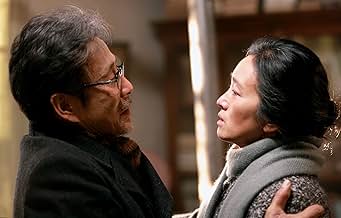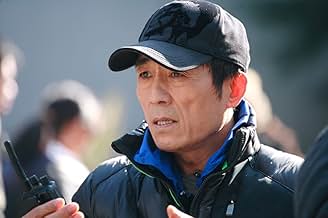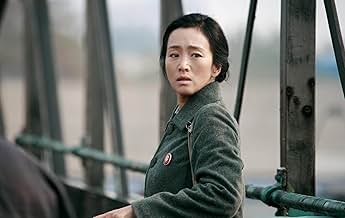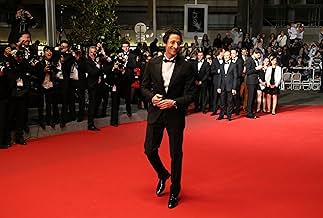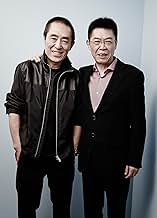AVALIAÇÃO DA IMDb
7,2/10
7 mil
SUA AVALIAÇÃO
Adicionar um enredo no seu idiomaLu and Feng are a devoted couple forced to separate when Lu is arrested and sent to a labor camp as a political prisoner during the Cultural Revolution. He finally returns home only to find ... Ler tudoLu and Feng are a devoted couple forced to separate when Lu is arrested and sent to a labor camp as a political prisoner during the Cultural Revolution. He finally returns home only to find that his beloved wife no longer recognizes him.Lu and Feng are a devoted couple forced to separate when Lu is arrested and sent to a labor camp as a political prisoner during the Cultural Revolution. He finally returns home only to find that his beloved wife no longer recognizes him.
- Direção
- Roteiristas
- Artistas
- Prêmios
- 23 vitórias e 49 indicações no total
- Direção
- Roteiristas
- Elenco e equipe completos
- Produção, bilheteria e muito mais no IMDbPro
Avaliações em destaque
Some of the dialog at the very beginning not quite correct and right during the Chinese Culture Revolution. The Chinese people in that darkest ten years torment, many jargon would not be said like what we heard in this movie. If the protagonist is a "Spy" as his daughter called him, he would already have been shot instead of banished to a far away poor farm as a labor. Such labors at that time were tagged as "Anti-Revolutionist" , "The Left Extremist", "Stinking Old Nine" or "The 5th Black Category Member". There were many carelessly written labeling names or words that didn't comply with that atrocious era. I was just amazed how the billion Chinese would let go of such torturous and treacherous when the Culture Revolution lost its goal and suddenly ended after 10 years living hell. Most Chinese are not like the Jewish people who had suffered so much that they would never let it go and so easily forget what their ancestors suffered. But the Chinese people are such weird species with extremely short memory. When every absurd but cruel movement ended, what they had experienced was just like the old Western saying: "Water under The Bridge", they just took it for granted and awaiting the next movement coming up to torture them. This is also explained why the CCP regime still exists so far, and again, the Chinese people are suffering the prison-like deadly control during a lightweight Omicron virus crisis. They are whining, crying and complaining, but I guess when the CCP decides to end the siege, they would immediately forget what they once suffered, just like what their parents and grandparents had suffered during the Cultural Revolution. Living under the iron fist of the CCP, Short Memory, Letting Go and Moving On maybe are all must-have for the 1.4 billion Chinese subjects?
Zhang yimou done it again. And Gong Li is more than ever - one of her best roles...i'm always hoping that she does more movies. And when Yimou and Gong Li work together it always comes an amazing movie. I wish they could go on professionaly together."Coming Home": It is a simple story, yet with powerful meanings. Everything is beautiful: the performances, the direction, the photography, the music... And that piano scene... Achingly. Every yimou's movies has such sensibility. He really knows how to touch.
Thank you Gong Li and Zhang Yimou.
An applause too for the male actor and the girl who played the daughter - hope she will get a great career.
Thank you Gong Li and Zhang Yimou.
An applause too for the male actor and the girl who played the daughter - hope she will get a great career.
"Coming Home" (2014 release from China; 110 min.) brings the story of Lu, a "rightist bastard" during the Cultural Revolution. As the movie opens, we see a woman (Feng) and her daughter (Dandan) being called into the Propaganda Office of the girl's school, where they learn that Lu (the husband and father, respectively) has escaped from labor camp, and that they are not to see him. Feng and Lu nevertheless decide to meet up at the train station, where Lu gets captured again. We are then told "Three years later, the Cultural Revolution ends", and Lu arrives back home. Much to his shock, Feng does not recognize him. What caused Feng's amnesia? Will she ultimately recognize him? To tell you more would spoil your viewing experience, you'll just have to see for yourself how it all plays out.
Couple of comments: this is the latest movie from director Zhang Yimou (best known here for "House of the Flying Daggers"), Here he tackles a potentially sensitive topic in China, namely the horrible Cultural Revolution. But don't think that this is a political movie. Instead, it is a love story that happens to be set during and after the Cultural Revolution. Feng is played by the leading Chinese actress Gong Li (think of her as the Meryl Streep of China), and plays the role with restraint and visible hurt. Special mention also for the beautiful Zhang Huiwen in the role of Dandan (check out the ballet performances!). Last but not least, I couldn't help but notice that the piano you hear in the orchestral score is played by none other than Lang Lang. Bottom line: "Coming Home" is a slow-moving (in the best possible way) movie that examines the long shadows of the Cultural Revolution through the eyes of one particular couple.
This movie is now a year and a half, yet it recently showed up out of the blue at my local art-house theater here in Cincinnati. Better late than never I suppose. The weekday evening screening where I saw this at was attended poorly. A shame. If you are in the mood for a top-notch quality foreign movie that is light years away from your standard Hollywood fare, you may want to give this a try. "Coming Home" is HIGHLY RECOMMENDED!
Couple of comments: this is the latest movie from director Zhang Yimou (best known here for "House of the Flying Daggers"), Here he tackles a potentially sensitive topic in China, namely the horrible Cultural Revolution. But don't think that this is a political movie. Instead, it is a love story that happens to be set during and after the Cultural Revolution. Feng is played by the leading Chinese actress Gong Li (think of her as the Meryl Streep of China), and plays the role with restraint and visible hurt. Special mention also for the beautiful Zhang Huiwen in the role of Dandan (check out the ballet performances!). Last but not least, I couldn't help but notice that the piano you hear in the orchestral score is played by none other than Lang Lang. Bottom line: "Coming Home" is a slow-moving (in the best possible way) movie that examines the long shadows of the Cultural Revolution through the eyes of one particular couple.
This movie is now a year and a half, yet it recently showed up out of the blue at my local art-house theater here in Cincinnati. Better late than never I suppose. The weekday evening screening where I saw this at was attended poorly. A shame. If you are in the mood for a top-notch quality foreign movie that is light years away from your standard Hollywood fare, you may want to give this a try. "Coming Home" is HIGHLY RECOMMENDED!
I'm was born in early 90s in China. As I grow up, my parents always consciously saving up everything. They do not waste anything, food, clothes, etc..
My mom is good at stitching clothes. Even thou she can afford buying a new pair of socks, she chose to stitch up the worn ones. I thought I'd never understand why my parents are so thrifty, until I watched this movie.
I came to realize what a hard, tough and poor life my parents had went thru after watching this movie. I was even surprised that my parents could actually survived that period of time.
I realized that people don't need that much of things to survive. When my friend and I shopping in mall, talking about cosmetics and luxury bags, and living a wealthy and "fancy" life, while my mother when she was in my age, struggling to live, wearing the same clothes everyday, celebrating her birthday by only eating an egg, running after trains in order to pick up the "coal ball" (trains in old time use coal as the fuel and the coal ball is the coal which was not fully burned, and could still being used for generating a little heat).
This is a great movie to honor that harsh period of time in China's history. And I'm also glad to see that Chinese government now allows people to talk about that period of time and even make a movie about it.
My mom is good at stitching clothes. Even thou she can afford buying a new pair of socks, she chose to stitch up the worn ones. I thought I'd never understand why my parents are so thrifty, until I watched this movie.
I came to realize what a hard, tough and poor life my parents had went thru after watching this movie. I was even surprised that my parents could actually survived that period of time.
I realized that people don't need that much of things to survive. When my friend and I shopping in mall, talking about cosmetics and luxury bags, and living a wealthy and "fancy" life, while my mother when she was in my age, struggling to live, wearing the same clothes everyday, celebrating her birthday by only eating an egg, running after trains in order to pick up the "coal ball" (trains in old time use coal as the fuel and the coal ball is the coal which was not fully burned, and could still being used for generating a little heat).
This is a great movie to honor that harsh period of time in China's history. And I'm also glad to see that Chinese government now allows people to talk about that period of time and even make a movie about it.
By 'simple pleasures', I don't mean that in any way to reference the Chinese Cultural Revolution, but his return to simple films, about simple people, beautifully crafted, acted, and very revealing about everyday Chinese life (as much as he is able).
Zhang Yimou (Chinese names put the surname first, IMDb doesn't, alas) is arguably one of the best directors of the 20th and early 21st centuries (best known in the West for House of Flying Daggers). He always evokes a magical feeling in me, and I love his technique and precision; almost every frame is a painting. He chose to remain in mainland China and has walked a very thin tightrope in making the kinds of films he has, as he does not shy away from the political situation in China, at least as part of everyday people's lives, which it is, of course. His films are just not primarily about Chinese politics (although his simple, but great early film, The Story of Qiu Ju, is about Chinese bureaucracy, and was indeed banned for a time. The fact that Gong Li, in this film, screams to the prison officials that have come to capture her husband, "What did you do to him to make him want to escape?", turning the blame for his prison escape back onto them, illustrates what their intl fame allows them to get away with.
Gong Li, Zhang Yimou's ex-wife, is, I believe, the premiere female actress in China (and now known worldwide, since the wonderful film, Raise the Red Lantern, was nominated for an Oscar in 1990), with good reason, and an actress of incredible breadth and depth. Even though she has been on many 'most beautiful people' lists, (she is very made up here (or down!)), her craft is everything and I cannot watch her enough. She is lately known here for Memoirs of a Geisha, as the evil Hatsumomo.
I was very, very glad to see Zhang Yimou and Gong Li reunite, professionally, for 2 recent films. They seem to push each other upward and she makes a perfect muse for him.
Ah, the film...(I love telling people about them!). Coming Home is about a couple dealing with and trying to reunite after Gong Li's husband is imprisoned for a couple of decades during the Cultural Revolution in China. She grows progressively ill, which adds to their difficulties, thus the meat of the movie is about their reuniting difficulties. Definitely without a stock Hollywood ending! I was struck by one very incredible scene... It is just a walk across the kitchen by Gong Li, when her husband is knocking at her door. She has been warned severely by the police. This walk seems to take several hours as she haltingly walks across the floor, with all the ramifications, both political and personal, flashing across her face and obviously in her mind. It is one of the most astonishing 20 seconds of film I think I have ever seen, and done without dialog, melodrama or Hollywood artifice.
Zhang Yimou has crafted a fine film here. It is slow, but in a good way, which builds a lot of emotional suspense. Someone said it only covers the last 20-30 pages of the book upon which it is based. As usual, every aspect of the film is top notch and it walks on the edge of the dramatic sword in a perfectly balanced manner. It will go down as another of my favorite Zhang Yimou movies. Be patient, although the tension he creates will keep you pinned, if not a bit frustrated, but that is also the beauty of it, and enjoy! And check out some of his other films!
Zhang Yimou (Chinese names put the surname first, IMDb doesn't, alas) is arguably one of the best directors of the 20th and early 21st centuries (best known in the West for House of Flying Daggers). He always evokes a magical feeling in me, and I love his technique and precision; almost every frame is a painting. He chose to remain in mainland China and has walked a very thin tightrope in making the kinds of films he has, as he does not shy away from the political situation in China, at least as part of everyday people's lives, which it is, of course. His films are just not primarily about Chinese politics (although his simple, but great early film, The Story of Qiu Ju, is about Chinese bureaucracy, and was indeed banned for a time. The fact that Gong Li, in this film, screams to the prison officials that have come to capture her husband, "What did you do to him to make him want to escape?", turning the blame for his prison escape back onto them, illustrates what their intl fame allows them to get away with.
Gong Li, Zhang Yimou's ex-wife, is, I believe, the premiere female actress in China (and now known worldwide, since the wonderful film, Raise the Red Lantern, was nominated for an Oscar in 1990), with good reason, and an actress of incredible breadth and depth. Even though she has been on many 'most beautiful people' lists, (she is very made up here (or down!)), her craft is everything and I cannot watch her enough. She is lately known here for Memoirs of a Geisha, as the evil Hatsumomo.
I was very, very glad to see Zhang Yimou and Gong Li reunite, professionally, for 2 recent films. They seem to push each other upward and she makes a perfect muse for him.
Ah, the film...(I love telling people about them!). Coming Home is about a couple dealing with and trying to reunite after Gong Li's husband is imprisoned for a couple of decades during the Cultural Revolution in China. She grows progressively ill, which adds to their difficulties, thus the meat of the movie is about their reuniting difficulties. Definitely without a stock Hollywood ending! I was struck by one very incredible scene... It is just a walk across the kitchen by Gong Li, when her husband is knocking at her door. She has been warned severely by the police. This walk seems to take several hours as she haltingly walks across the floor, with all the ramifications, both political and personal, flashing across her face and obviously in her mind. It is one of the most astonishing 20 seconds of film I think I have ever seen, and done without dialog, melodrama or Hollywood artifice.
Zhang Yimou has crafted a fine film here. It is slow, but in a good way, which builds a lot of emotional suspense. Someone said it only covers the last 20-30 pages of the book upon which it is based. As usual, every aspect of the film is top notch and it walks on the edge of the dramatic sword in a perfectly balanced manner. It will go down as another of my favorite Zhang Yimou movies. Be patient, although the tension he creates will keep you pinned, if not a bit frustrated, but that is also the beauty of it, and enjoy! And check out some of his other films!
Você sabia?
- CuriosidadesAmor Para a Eternidade (2014) had its international premiere at the 2014 Cannes Film Festival in the out of competition section. It was scheduled to be screened in the Special Presentations section of the 2014 Toronto International Film Festival.
- ConexõesFeatured in Sven Uslings Bio: Bästa filmer 2020 Del 1: Plats 20-11 (2021)
- Trilhas sonorasSong of the Fishermen
Written by Ren Guang
Arranged by Quigang Chen
Principais escolhas
Faça login para avaliar e ver a lista de recomendações personalizadas
- How long is Coming Home?Fornecido pela Alexa
Detalhes
- Data de lançamento
- País de origem
- Central de atendimento oficial
- Idioma
- Também conhecido como
- Coming Home
- Locações de filme
- Empresas de produção
- Consulte mais créditos da empresa na IMDbPro
Bilheteria
- Faturamento bruto nos EUA e Canadá
- US$ 377.607
- Fim de semana de estreia nos EUA e Canadá
- US$ 26.361
- 13 de set. de 2015
- Faturamento bruto mundial
- US$ 47.587.984
- Tempo de duração
- 1 h 49 min(109 min)
- Cor
- Mixagem de som
- Proporção
- 2.35 : 1
Contribua para esta página
Sugerir uma alteração ou adicionar conteúdo ausente







